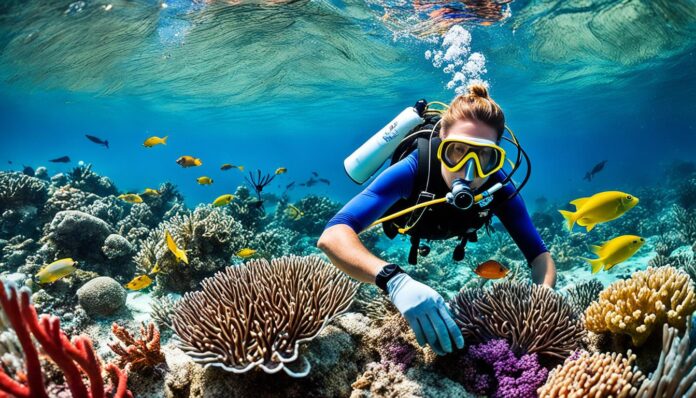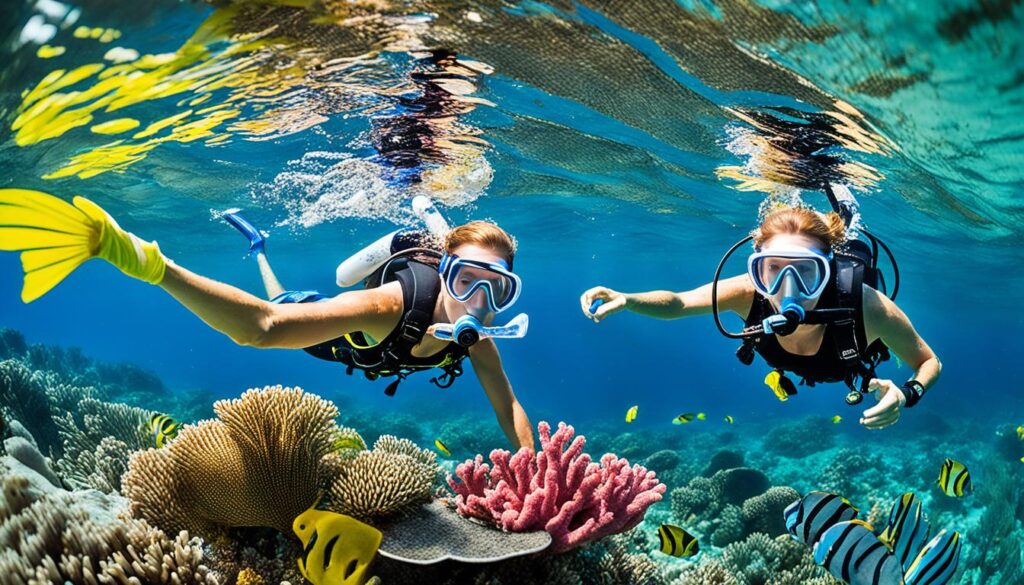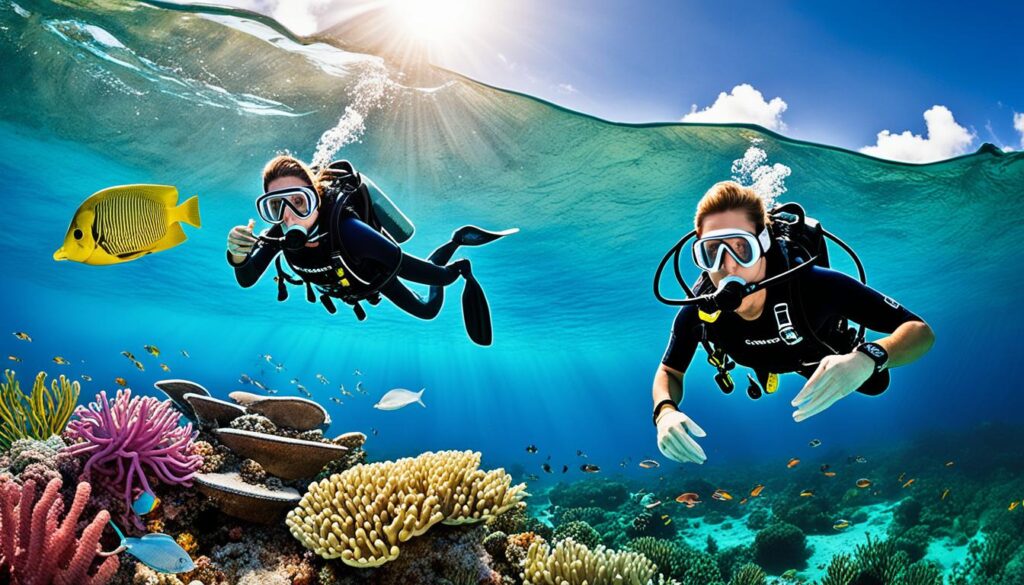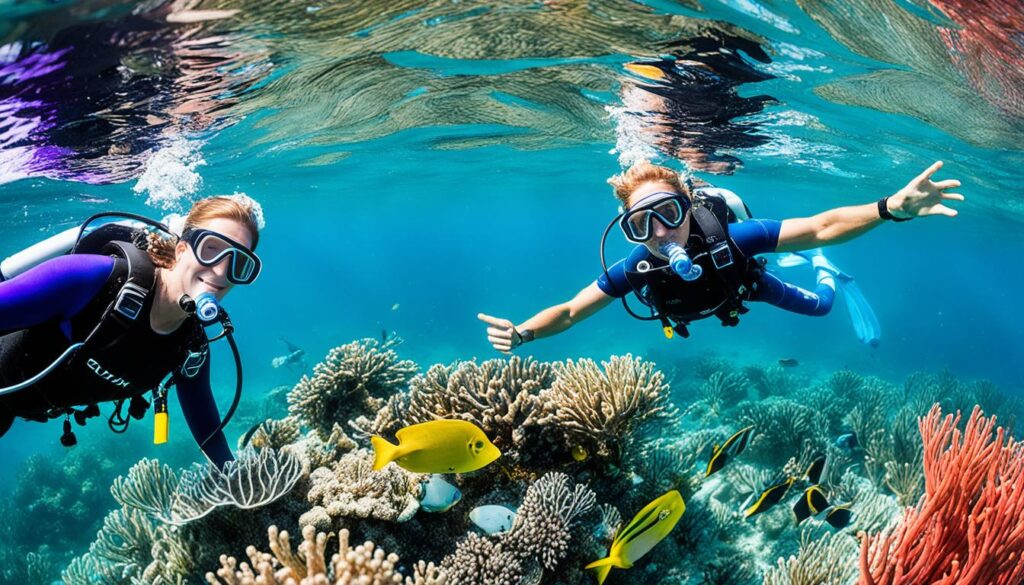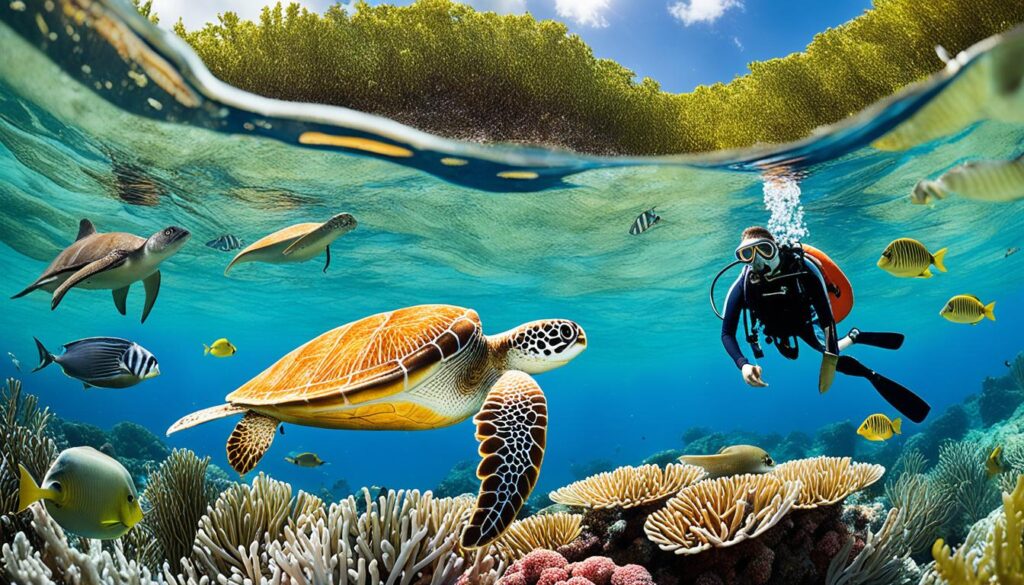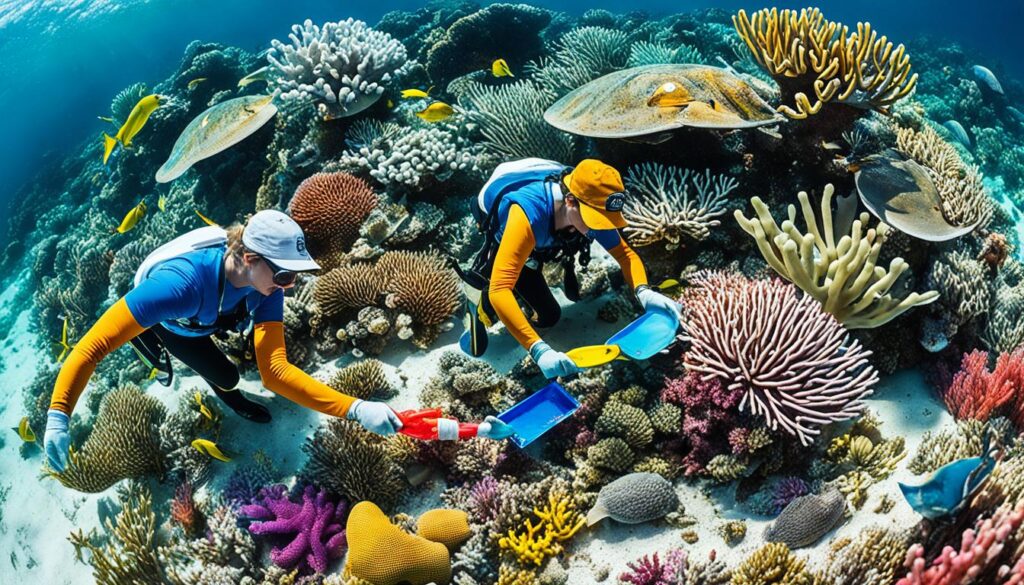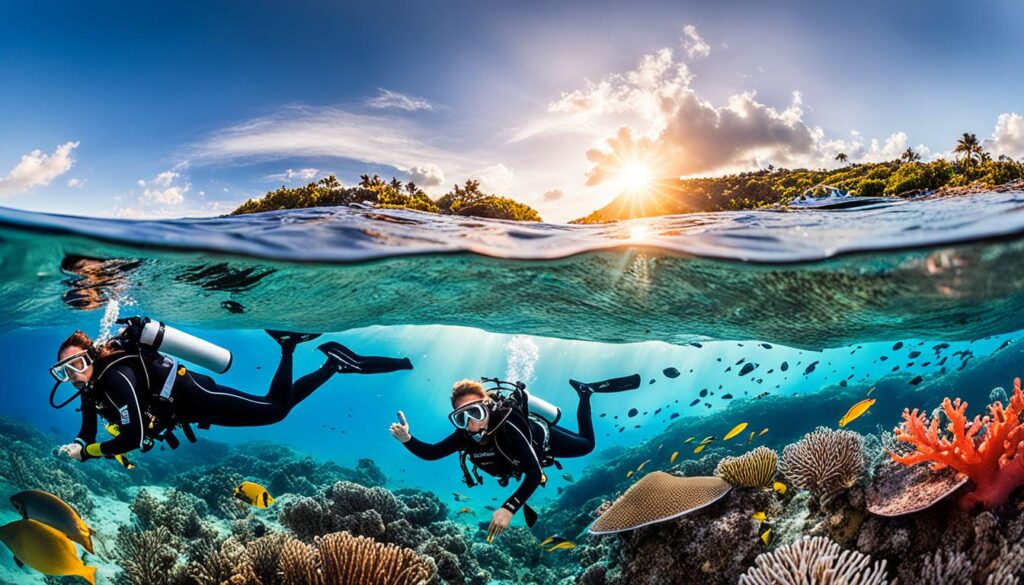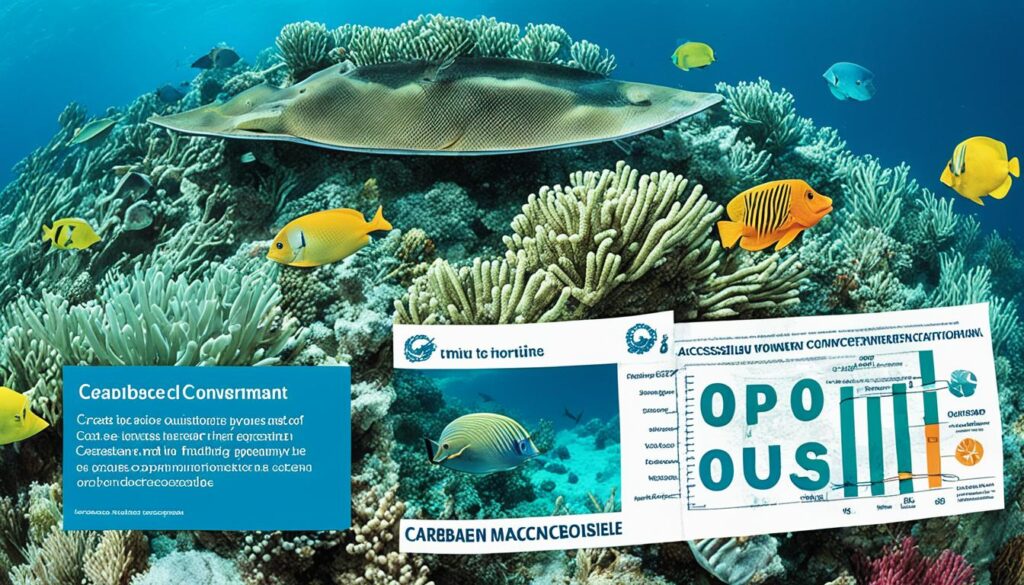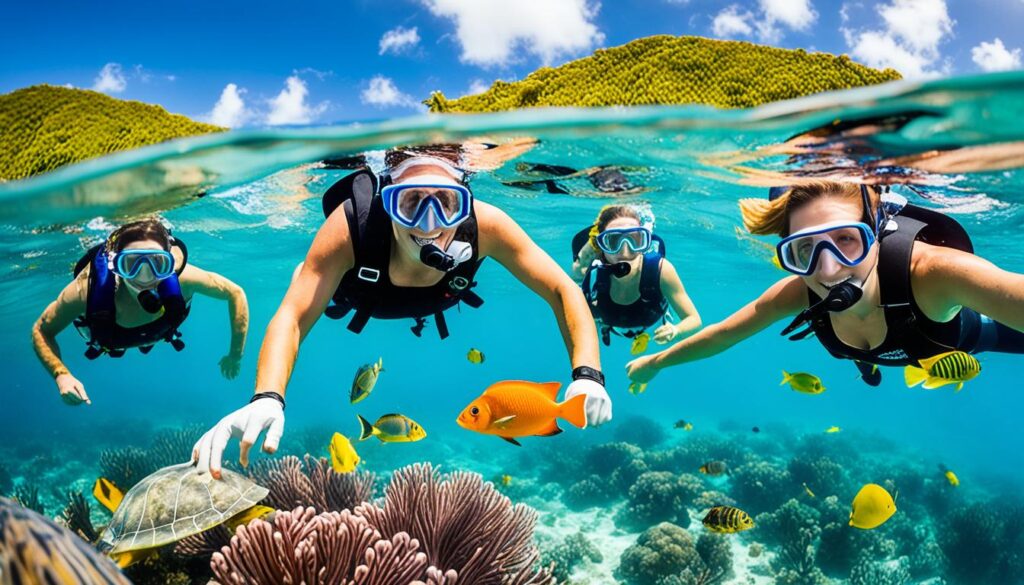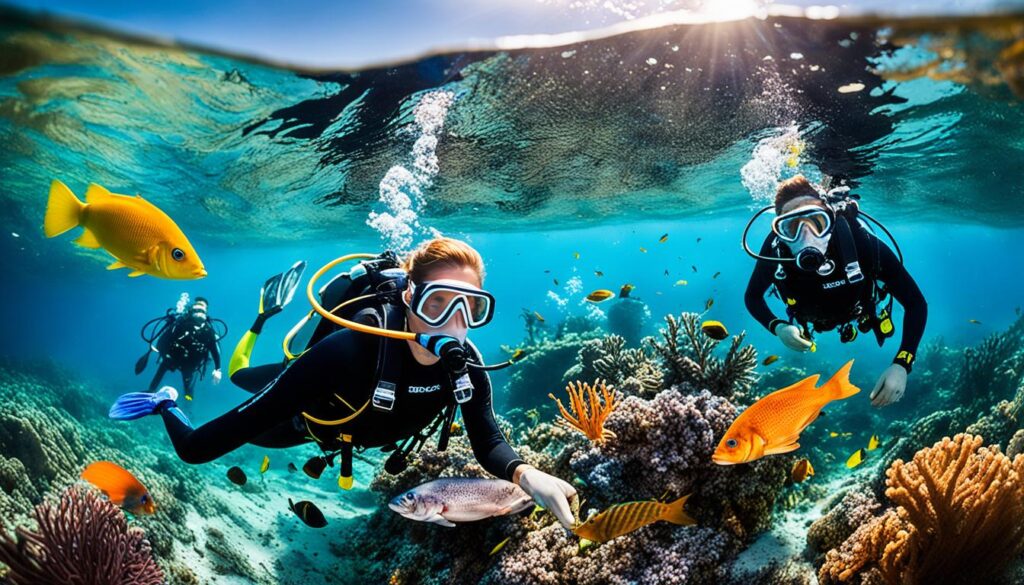Have you ever dreamt of immersing yourself in the crystal-clear turquoise waters of the Caribbean while making a positive impact?
Imagine being able to contribute to the preservation of marine life and ecosystems, all while exploring the breathtaking beauty of the Caribbean. Volunteer opportunities in the Caribbean for marine conservation are waiting for you!
Whether you’re a passionate scuba diver, aspiring marine biologist, or simply someone who cares deeply about our oceans, the Caribbean offers a wealth of marine conservation volunteer programs that allow you to be a part of something bigger.
Intrigued? Curious about the incredible experiences and opportunities that await you? Keep reading to uncover the reasons why volunteering for marine conservation in the Caribbean is a truly rewarding experience, the types of volunteer programs available, and how you can get started on your journey to protect and preserve these precious marine ecosystems.
Why Volunteer for Marine Conservation in the Caribbean?
If you have a passion for marine animals and a desire to contribute to the preservation of Caribbean ecosystems, volunteering for marine conservation in the Caribbean is an excellent opportunity. Not only will you have the chance to work closely with marine animals, but you will also make a meaningful impact on the region’s rich biodiversity. Here are some compelling reasons why you should consider volunteering for marine conservation in the Caribbean:
1. Diverse Range of Projects
The Caribbean offers a wide range of marine conservation projects to suit various interests and skill sets. From coral reef restoration and sea turtle conservation to marine mammal research and environmental education, there are projects available for everyone. You can choose a project that aligns with your passion and contribute to the specific area of marine conservation that resonates with you.
2. Hands-On Experience with Marine Animals
Volunteering in the Caribbean allows you to work hands-on with marine animals such as sea turtles, dolphins, and reef fish. This unique opportunity not only provides an unforgettable experience but also allows you to contribute directly to the well-being and protection of these magnificent creatures.
3. Environmental Stewardship
The Caribbean marine ecosystems face various threats, including habitat degradation, overfishing, and climate change. By volunteering for marine conservation projects, you become an environmental steward, actively participating in efforts to protect and restore these fragile ecosystems. Your contribution will help safeguard the future of the Caribbean’s marine biodiversity for generations to come.
4. Personal Growth and Skill Development
Engaging in marine conservation volunteer work in the Caribbean allows you to develop new skills and expand your knowledge in marine biology, research methods, and conservation practices. You will gain practical experience and build transferable skills such as teamwork, problem-solving, and leadership, all of which are valuable assets in various professional fields.
“Volunteering for marine conservation in the Caribbean not only allows you to make a positive impact on the environment but also offers an incredible opportunity for personal growth and skill development.” – Volunteer Name
5. Cultural Immersion
Volunteering in the Caribbean provides a unique chance to immerse yourself in the local culture and build connections with the communities living in close proximity to the marine ecosystems. You will have the opportunity to learn about Caribbean traditions, cuisine, and customs, enriching your volunteer experience and creating lasting memories.
6. Networking and Collaboration
Volunteering for marine conservation in the Caribbean exposes you to a network of like-minded individuals, including fellow volunteers, researchers, and conservationists. This network can be invaluable for future collaborations, career opportunities, and continued involvement in marine conservation efforts.
7. Contributing to Sustainable Tourism
Tourism plays a significant role in the Caribbean economy. By volunteering for marine conservation, you actively contribute to sustainable tourism practices and promote responsible travel. Through education and awareness initiatives, you can help empower local communities and tourists to respect and protect the marine environment.
By volunteering for marine conservation in the Caribbean, you have the power to make a tangible difference in protecting these precious coastal ecosystems and the incredible marine animals that call them home. From the hands-on experience with marine animals to the personal growth and cultural immersion, your volunteer journey in the Caribbean will not only be rewarding but also contribute to the long-term sustainability of our oceans.
Types of Volunteer Programs
When it comes to marine conservation in the Caribbean, there are a variety of volunteer programs available to suit your interests and commitment level. Whether you’re looking for short-term volunteer opportunities or long-term internships, these programs offer a range of experiences that allow you to make a meaningful contribution to the preservation of marine ecosystems.
| Program Type | Description |
|---|---|
| Marine Conservation Volunteer Programs | These programs focus on hands-on conservation work, such as reef monitoring, sea turtle conservation, coral restoration, and marine debris cleanup. Volunteers actively participate in data collection, research, and habitat restoration. |
| Marine Conservation Internships | Internships provide a more immersive experience for individuals looking to gain valuable skills and knowledge in the field of marine conservation. Interns work closely with marine biologists, researchers, and conservationists on specific projects, conducting research and analysis. |
| Community Outreach and Education | These programs focus on engaging with local communities and raising awareness about marine conservation. Volunteers may assist in organizing educational workshops, designing outreach materials, and promoting sustainable practices. |
| Marine Wildlife Rehabilitation | Volunteers in these programs work with marine wildlife rescue centers, assisting in the rehabilitation and care of injured or stranded marine animals. They may be involved in feeding, cleaning enclosures, and providing enrichment for animals. |
Regardless of the program you choose, volunteering in marine conservation allows you to contribute directly to the protection of the Caribbean’s marine life while gaining valuable insights into marine ecosystems and conservation efforts.
Organizations for Marine Conservation in the Caribbean
When it comes to marine conservation in the Caribbean, numerous organizations are dedicated to protecting and preserving the region’s precious ecosystems. These organizations play a vital role in preserving marine life, promoting sustainability, and raising awareness about the importance of conservation efforts.
One such organization is the Caribbean Marine Conservation Society (CMCS). With a mission to safeguard the diverse marine habitats of the Caribbean, CMCS focuses on conservation projects, scientific research, and community engagement. Through their initiatives, CMCS strives to create a sustainable future for the Caribbean’s marine ecosystems.
Another prominent organization is Ocean Guardians Caribbean. This non-profit organization is committed to the protection of marine species and their habitats through research, education, and advocacy. Ocean Guardians Caribbean actively involves volunteers in their conservation efforts, providing a hands-on learning experience to contribute to the preservation of Caribbean marine life.
“Volunteering with marine conservation organizations in the Caribbean allows you to make a direct impact on the region’s fragile ecosystems while gaining valuable insights and skills,” says Jane Johnson, a dedicated volunteer and advocate for marine conservation.
Caribbean Reef Conservation Association (CRCA) is another organization that focuses on the restoration and conservation of coral reefs in the Caribbean. Through their volunteer programs, individuals can participate in reef monitoring, coral restoration, and community outreach initiatives. CRCA aims to create a network of informed individuals working towards the recovery and resilience of Caribbean coral reefs.
By engaging with these organizations dedicated to marine conservation in the Caribbean, you have the opportunity to contribute to meaningful projects, collaborate with like-minded individuals, and learn from experts in the field. Whether you are passionate about protecting marine animals, conserving coral reefs, or promoting sustainable fishing practices, there are organizations in the Caribbean that align with your interests and values.
Continue reading to learn more about the responsibilities involved in volunteering for marine conservation in the Caribbean and the skills and qualifications that can enhance your volunteer opportunities.
| Organization | Missions | Initiatives |
|---|---|---|
| Caribbean Marine Conservation Society (CMCS) | Safeguard marine habitats of the Caribbean | Conservation projects, scientific research, community engagement |
| Ocean Guardians Caribbean | Protect marine species and their habitats | Research, education, advocacy |
| Caribbean Reef Conservation Association (CRCA) | Restore and conserve Caribbean coral reefs | Reef monitoring, coral restoration, community outreach |
Volunteer Responsibilities
When you volunteer for marine conservation in the Caribbean, you play a vital role in protecting the region’s precious ecosystems. Your efforts contribute to the preservation of marine life and the sustainability of these coastal environments. As a Caribbean marine conservation volunteer, you’ll have a range of responsibilities that focus on monitoring, data collection, and community engagement.
Reef Monitoring
One of the key responsibilities you may have as a Caribbean marine conservation volunteer is participating in reef monitoring activities. This involves conducting regular surveys to assess the health of coral reefs, documenting species diversity, and noting any signs of stress or damage.
Data Collection
Data collection is another crucial responsibility you’ll undertake as a marine conservation volunteer in the Caribbean. You may assist in collecting data on water quality, temperature, and other environmental factors to contribute to scientific research and ongoing monitoring efforts.
Community Education
Volunteering for marine conservation in the Caribbean also involves educating local communities about the importance of preserving marine ecosystems. You may have the opportunity to lead workshops, give presentations, or participate in outreach initiatives to raise awareness and inspire others to take action.
“Volunteering for marine conservation in the Caribbean allows you to make a tangible difference in protecting marine life while gaining valuable hands-on experience and skills.” – [Full Name]
These volunteer responsibilities offer a well-rounded experience that combines scientific research, community engagement, and environmental education. By actively participating in these activities, you contribute to the overall conservation efforts in the Caribbean, helping to ensure the long-term health and well-being of marine species and habitats.
Skills and Qualifications
When it comes to marine conservation volunteer opportunities in the Caribbean, having certain skills and qualifications can enhance your experience and make you a valuable asset to the projects you’ll be involved in. While previous experience is not always required, possessing these skills can greatly contribute to your effectiveness in marine conservation efforts.
Underwater Research and Monitoring
Being comfortable in the water is essential for marine conservation work in the Caribbean. If you have experience in scuba diving or snorkeling, it can be a significant advantage. Familiarity with underwater research techniques, such as data collection and species identification, is highly valuable.
Marine Biology Knowledge
Having a background in marine biology or a related field can provide you with a deeper understanding of the marine ecosystems you’ll be working to protect. Knowledge of marine species, habitats, and conservation practices will help you make informed decisions and contribute effectively to preservation efforts.
Environmental Awareness
Having a strong sense of environmental awareness is crucial for marine conservation work. Understanding the impact of human activities on marine ecosystems and the importance of sustainable practices is key. Awareness of local conservation issues specific to the Caribbean is also beneficial.
Teamwork and Communication
Volunteering in marine conservation often involves working as part of a team. Having strong teamwork skills and effective communication abilities will allow you to collaborate efficiently with fellow volunteers, researchers, and local communities. This ensures a cohesive effort towards achieving conservation goals.
Language Skills
While not always mandatory, proficiency in languages commonly spoken in the Caribbean, such as English, Spanish, or French, can help facilitate communication with local communities and stakeholders. It can also enhance your overall experience, allowing for deeper engagement and cultural exchange.
“The oceans are calling, and the Caribbean provides the perfect backdrop for marine conservation volunteering. Join us in protecting this incredible ecosystem and make a lasting impact on the future of our planet!”
Regardless of your current skill set, it’s important to remember that volunteer opportunities in the Caribbean for marine conservation are open to individuals of all backgrounds and levels of experience. Organizations offering such programs often provide training and support to ensure volunteers can contribute effectively. So, don’t hesitate to embark on this rewarding journey and play your part in preserving the stunning marine environments of the Caribbean.
| Skills | Benefits |
|---|---|
| Underwater research and monitoring | Contribute to data collection, species identification, and ecosystem monitoring |
| Marine biology knowledge | Understand marine species, habitats, and conservation practices |
| Environmental awareness | Promote sustainable practices and understand conservation challenges |
| Teamwork and communication | Collaborate effectively with fellow volunteers and local stakeholders |
| Language skills | Facilitate communication with local communities and enhance cultural exchange |
Training and Support
When you participate in marine conservation volunteer programs or internships in the Caribbean, you can expect comprehensive training and support from the organizations involved. These programs are designed to ensure that you have the necessary knowledge and guidance to make a significant contribution to marine conservation efforts.
The training provided focuses on various aspects of marine conservation, including:
- Marine ecosystem awareness: You will learn about the delicate balance of marine ecosystems, the importance of biodiversity, and the threats facing marine life.
- Conservation methods and techniques: You will receive instruction on conservation practices, such as marine species identification, reef surveying, and data collection.
- Sustainable practices: Organizations emphasize the importance of sustainable practices in marine conservation and provide training on topics such as responsible diving, waste management, and marine life protection.
In addition to training, you can expect ongoing support throughout your volunteer experience. The organizations have experienced staff members and marine conservation experts who will be available to answer any questions, provide guidance, and ensure your safety during activities.
“The support I received during my marine conservation volunteer program in the Caribbean was exceptional. The staff were always there to guide me and help me make a difference in protecting the ocean environment.” – Sarah, former volunteer
The combination of training and support ensures that you are well-prepared and confident in your role as a marine conservation volunteer or intern. It enables you to actively contribute to the preservation of the Caribbean’s marine ecosystems and make a positive impact on the region.
Testimonials
Read what other volunteers have to say about the training and support they received during their marine conservation experiences:
| Volunteer Name | Program | Testimonial |
|---|---|---|
| Michael | Caribbean Marine Conservation Project | “The training sessions were thorough and provided me with the skills and knowledge I needed to contribute to the project. The staff was always available to answer my questions and support me throughout my time as a volunteer.” |
| Lisa | Tropical Marine Biology Internship | “The support I received throughout my internship was incredible. The team provided guidance and mentorship, allowing me to learn and grow as a marine conservationist. I felt like a valued member of the project.” |
| David | Coral Reef Restoration Volunteer Program | “The training was hands-on and practical, which made me feel confident in my abilities to carry out necessary tasks. The project coordinators were always there to support me and ensure that I was making a positive impact on reef restoration.” |
Accommodation and Logistics
When participating in marine conservation projects in the Caribbean, it’s important to have a comfortable and well-organized experience. Here are some insights into the accommodation and logistics arrangements for volunteers:
Housing Options
Depending on the marine conservation program you choose, there may be different housing options available. Some programs offer shared volunteer houses where you can connect with like-minded individuals from around the world. Other programs may provide homestay options, allowing you to immerse yourself in the local culture and community.
Transportation
Getting to and around the Caribbean for your marine conservation volunteer work is essential. Many programs offer airport pickups upon your arrival to ensure a smooth transition. Local transportation options, such as buses or shuttles, are often organized to facilitate travel between project sites and other destinations.
Daily Logistics
While volunteering, you’ll want to be prepared for your daily activities. It’s important to inquire about the facilities and amenities available at the accommodation, such as shared kitchens, laundry facilities, and communal spaces. Some programs may provide meals, while others may require you to prepare your own food.
Volunteering for marine conservation in the Caribbean offers a unique opportunity to live and work in a stunning natural environment. Being prepared and informed about accommodation and logistics can enhance your volunteering experience.
With an understanding of the housing options, transportation arrangements, and daily logistics, you can focus on making a meaningful impact on marine conservation efforts in the Caribbean.
Pros and Cons of Accommodation Options
| Housing Option | Pros | Cons |
|---|---|---|
| Shared Volunteer Houses |
|
|
| Homestay |
|
|
Considering the pros and cons of each housing option can help you choose the one that aligns with your preferences and enhances your marine conservation volunteer experience.
Cost and Funding
When considering marine conservation volunteer programs in the Caribbean, it’s important to explore the cost and funding options associated with these experiences. While volunteer work is a rewarding endeavor, it’s essential to understand the financial aspects to make an informed decision. Here, we break down potential expenses, fundraising opportunities, and scholarships that can assist in covering the costs of your Caribbean marine conservation volunteer work.
Cost Breakdown
Participating in marine conservation volunteer programs in the Caribbean may involve various costs. These expenses can include program fees, travel expenses to and from the destination, accommodation, meals, and additional expenses for recreational activities during free time. It’s crucial to carefully review the program details to understand the complete cost breakdown before making a commitment.
Fundraising Opportunities
If you’re concerned about the financial aspect of volunteering, rest assured that there are fundraising opportunities available to help support your marine conservation journey in the Caribbean. Fundraising can be done through various means, such as hosting events, reaching out to friends and family for donations, or creating online fundraising campaigns through crowdfunding platforms. Expressing your passion for marine conservation and explaining the purpose behind your volunteer work can greatly inspire others to contribute to your cause.
Scholarships
For individuals seeking financial assistance for their Caribbean marine conservation volunteer work, scholarships are an excellent option to explore. Many organizations and institutes offer scholarships specifically aimed at supporting volunteers in their conservation efforts. These scholarships can help cover program fees, travel expenses, and other associated costs. Research and apply for scholarships that align with your goals and aspirations, increasing the likelihood of receiving financial aid for your volunteer experience.
| Costs | Fundraising Opportunities | Scholarships |
|---|---|---|
|
|
|
By considering the cost and funding options available, you can make an informed decision about your marine conservation volunteer journey in the Caribbean. Remember, while there may be expenses associated with these programs, the knowledge that you are contributing to the preservation of the Caribbean’s marine life is invaluable.
Impact and Benefits
Volunteering for marine conservation in the Caribbean offers a unique opportunity to have a lasting impact on the region’s marine ecosystems and local communities. By dedicating your time and skills to these important projects, you can make a significant difference in preserving the beauty and biodiversity of the Caribbean’s marine life.
Protect Marine Ecosystems
- Contribute to the conservation and restoration of coral reefs, seagrass meadows, and mangrove forests.
- Participate in monitoring and research efforts to better understand and protect marine species and habitats.
- Help mitigate the impacts of climate change on marine ecosystems through sustainable practices and community engagement.
Support Local Communities
- Empower local communities by sharing knowledge and promoting sustainable fishing practices that ensure a thriving marine environment for future generations.
- Engage in educational initiatives that raise awareness about the importance of marine conservation and inspire local action.
- Contribute to socio-economic development by supporting eco-tourism initiatives that provide alternative livelihoods for coastal communities.
Create Lasting Positive Change
By volunteering with marine animals in the Caribbean and participating in marine conservation projects, you become an ambassador for change. Your efforts can inspire others to take action and foster a culture of environmental stewardship in the Caribbean and beyond.
“The ocean is a source of life and wonder. By volunteering with marine conservation projects in the Caribbean, you are not only helping protect marine ecosystems but also fueling a movement towards a more sustainable future.”
– David Smith, Marine Biologist
Immerse yourself in the beauty of the Caribbean’s turquoise waters and breathtaking marine life as you contribute to the conservation of this precious ecosystem. Volunteering for marine conservation in the Caribbean allows you to connect with nature, gain valuable skills, and create memories that last a lifetime.
How to Get Started
Ready to embark on your volunteer journey in Caribbean marine conservation? Follow these steps to get started and make a positive impact on marine life in the region.
1. Research Volunteer Opportunities
Begin by researching volunteer opportunities in the Caribbean for marine conservation. Look for reputable organizations that offer marine conservation volunteer programs. Explore their projects, locations, and the specific work you’ll be involved in.
2. Evaluate Your Interests and Skills
Consider your interests and skills when choosing a volunteer program. Are you passionate about sea turtle conservation, coral reef restoration, or marine research? Identify the projects that align with your interests and maximize your strengths.
3. Review Application Process and Deadlines
Review the application process and deadlines for each marine conservation volunteer program. Take note of any requirements such as application forms, references, or interviews. Ensure you meet all the necessary criteria and submit your application before the deadline.
4. Seek Resources and Recommendations
Gather resources and recommendations to help you choose the right program. Seek advice from fellow volunteers or professionals in the field. Utilize online platforms, forums, or social media groups where volunteers share their experiences and insights.
5. Prepare for Your Experience
Prepare for your volunteer experience by researching the local culture, environment, and any necessary vaccinations or travel requirements. Take the time to understand the project objectives and familiarize yourself with the marine conservation practices specific to the Caribbean.
6. Fundraising and Financial Planning
Consider the costs associated with marine conservation volunteer programs and evaluate your financial options. Explore fundraising opportunities, personal savings, or scholarships available to support your volunteer journey in the Caribbean.
7. Stay Connected with the Organization
Once you’ve selected a program, stay connected with the organization. Communicate regularly with the program coordinators, ask questions, and seek guidance. They can provide valuable information and support as you prepare for your marine conservation volunteer experience.
By following these steps, you’ll be well on your way to starting your volunteer journey in Caribbean marine conservation. Take the first step and make a positive impact on the preservation of marine ecosystems in the Caribbean.
Conclusion
Summarize the key points and encourage readers to embark on their Caribbean marine conservation volunteer experience. Highlight the opportunities for personal growth, skill-building, and the chance to make a tangible difference in the preservation of the Caribbean’s marine life.
By volunteering for marine conservation in the Caribbean, you have the chance to contribute to the protection of sea life and promote sustainability in one of the world’s most diverse ecosystems. Through hands-on work and close interaction with marine animals, you can play a vital role in preserving the rich biodiversity of the Caribbean.
Not only will this experience allow you to make a positive impact, but it also offers numerous personal benefits. You’ll develop valuable skills in research, data collection, and community engagement, enhancing your resume and future career prospects. Additionally, the cultural immersion and connections made with like-minded individuals will create lifelong memories and friendships.




























